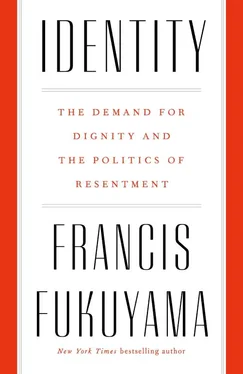It should not be surprising that immigration has triggered a backlash, since levels of migrants and corresponding cultural change have been high and in some cases historically unprecedented. Table 2provides data on the numbers of foreign-born individuals in a group of rich countries over the past sixty years. Levels in the United States are today as high as they were in the 1920s following the large wave of immigrants who entered the country before and after the turn of the twentieth century.
The common objective of populist politicians in both Europe and the United States is to “take back our country.” They argue that traditional understandings of national identity are being diluted and overtaken both by newcomers with different values and cultures and by a progressive left that attacks the very idea of national identity as racist and intolerant.
But what country are they trying to take back? The U.S. Constitution begins with the statement “We, the People of the United States, in Order to form a more perfect Union, establish Justice, insure domestic Tranquility, provide for the common defence, promote the general Welfare, and secure the Blessings of Liberty to ourselves and our Posterity, do ordain and establish this Constitution for the United States of America.” The Constitution says clearly that the people are sovereign and that legitimate government flows from their will. But it does not define who the people are, or on what basis individuals are to be included in the national community.
This silence in the American Constitution raises some important questions: Where does national identity come from in the first place, and how is it defined? What makes for a “people,” whose sovereignty is the basis for democratic choice? Is multiculturalism, both de facto and as an ideology, weakening our sense of common citizenship, and if so, are there means of rebuilding a shared understanding of national identity across populations that are diverse?
The American Constitution’s failure to define who the American people are reflects a broader problem for all liberal democracies. The political theorist Pierre Manent notes that most democracies were built on top of preexisting nations, societies that already had a well-developed sense of national identity that defined the sovereign people. But those nations were not created democratically: Germany, France, Britain, and the Netherlands were all the historical by-products of long and often violent political struggles over territory and culture under nondemocratic regimes. When these societies democratized, their territorial extent and their existing populations were simply taken for granted as the basis for popular sovereignty. A similar story could be told for Japan and Korea in East Asia, which were nations centuries before they democratized and did not have to litigate issues of peoplehood as they opened up politics to democratic choice. {11}
Manent identifies a major gap in modern democratic theory. Thinkers such as Thomas Hobbes, John Locke, Jean-Jacques Rousseau, Immanuel Kant, the authors of the Federalist Papers, and John Stuart Mill all assumed that the world was predivided into nations that formed the foundation of democratic choice. They did not provide a theory of why the border between the United States and Mexico should run along the Rio Grande, whether Alsace should belong to France or Germany, whether Quebec should be part of Canada or a “distinct society,” on what grounds Catalonia could legitimately separate itself from Spain, or what the proper level of immigration should be.
Such theorizing has been left to others. Nationalists such as Paul de Lagarde or Adolf Hitler grounded their definitions of nation in biology and argued that the existing nations of the world constituted racial entities that had existed from time immemorial. Others made an allegedly unchanging inherited culture the basis for nationhood. Such theories became the justification for the aggressive nationalisms of early twentieth-century Europe, whose exponents were defeated with the fall of Nazism in 1945.
Those one might characterize as “global cosmopolitans” argue that the very concepts of national identity and state sovereignty are outmoded and need to be replaced by broader transnational identities and institutions. Two types of argument underpin this school. The first is economic and functional, saying that problems today are global in scope and therefore need to be addressed globally. Such issues range from trade and investment to counterterrorism, the environment, infectious diseases, narcotics, human trafficking, and many others. Nations and national identities are potential obstacles to international cooperation and need to be gradually superseded by a new layer of transnational rules and organizations.
The second strand of argument is more theoretical and comes out of international human rights law. Liberal democracies are built on a premise of universal human equality, and that equality does not begin or end at national borders. The 1948 Universal Declaration of Human Rights became the basis for a growing body of international law that asserted that rights are inherent in all human beings and need to be respected by all nations. {12} As human rights law has evolved, so have the obligations of states not just to their own citizens, but to immigrants and refugees as well. Some advocates have even posited a universal right to migrate. {13}
Both of these arguments are valid to some degree. But they do not undermine the case for an international order built around national states, or for the necessity of the right sort of national identity within those states. The idea that states are obsolete and should be superseded by international bodies is flawed because no one has been able to come up with a good method for holding such international bodies democratically accountable. The functioning of democratic institutions depends on shared norms, perspectives, and ultimately culture, all of which can exist on the level of a national state, but which do not exist internationally. Effective international cooperation can and has been built instead around cooperation between existing states. For decades now nations have been giving up aspects of their sovereignty to protect their national interests. {14} The kinds of cooperative agreements needed to resolve a host of issues can continue to be addressed in this fashion.
The obligation to respect universal human rights has been voluntarily undertaken by most countries around the world, and rightly so. But all liberal democracies are built on top of states, whose jurisdiction is limited by their territorial reach. No state can undertake an unlimited obligation to protect people outside its jurisdiction, and whether the world would be better off if they all tried to do so is not clear. While countries rightly feel a moral obligation to shelter refugees and may welcome immigrants, such obligations are potentially costly both economically and socially, and democracies need to balance them against other priorities. Democracy means that the people are sovereign, but if there is no way of delimiting who the people are, they cannot exercise democratic choice.
Thus political order both at home and internationally will depend on the continuing existence of liberal democracies with the right kind of inclusive national identities. But we have yet to explain the provenance of such identities in existing democracies, and how they might change in the future.
It is difficult to theorize about national identity because existing nations are the by-product of complex and messy historical struggles that have often been violent and coercive. The resulting nations are workable platforms on which to create democratic institutions, but the outcomes continue to be contested and are constantly challenged by demographic, economic, and political change.
Читать дальше












